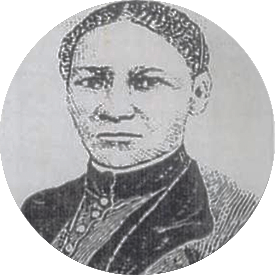Harriet Baker

Harriet Baker (1829–1913), a popular preacher and evangelist, surprised Americans with her relentless pursuit to preach the gospel of Jesus Christ. Harriet endured numerous trials in her day, yet prepared black and white congregations alike to receive women in the pulpit.
Harriet was born as a free woman to William and Harriet Cole in Havre de Grace, Maryland in 1829. She was one of seven children and was left fatherless at age eleven. In addition, the threat of being kidnapped and sold into slavery was a fearful reality for young Harriet. Kidnappers “would hurry them away, and sell them into slavery, and if intercepted, and remonstrated with, they would charge the unfortunate with having run away from bondage, or with having stolen something.” In defense of her children, Harriet’s mother hired her out to protect her from kidnappers and would strip her of her clothes in front her employer to assure them that Harriet had not stolen anything.
Harriet’s life-changing conversion experience in 1842 was marked by a significant encounter of God’s power. Harriet’s mother took her to a prayer meeting that consisted of about sixteen women in a small room. The women began to pray and sing until the temperature increased in the room. Harriet said that, as she leaned against the fireplace, “the fire of God struck me down” in that state she experienced God and was converted. Little did she know that God would later commission her, an illiterate colored woman, to preach the gospel to thousands in Northeastern America.
Before her commissioning, Harriet married a fugitive slave named William Baker in 1845 and the couple settled in Columbia, PA. Their marriage was not without trials. The Fugitive Slave Bill was passed, and in 1851 Harriet’s husband was one of the first to feel the effects of this law—he was captured and taken back to Maryland. In response, Harriet mortgaged their house and raised the money to purchase his freedom.
In all of Harriet’s endeavors to grow in the knowledge of God, she could not shake her burden to evangelize. Controversy surrounded Harriet as she announced her call to preach in 1872. The announcement brought opposition from her church and her husband. Harriet was a member of an African Methodist Episcopal Church (AME) that neither ordained nor accepted women preachers. Leaders of the church publicly resisted her and her pastor declaimed against her in the pulpit, saying, “God never intended women to preach the gospel.”
Harriet began her labors without the blessing of her church family, but her burden to preach was not quashed by opposition. The persecution of her peers did not override her encounter with the love of Christ for His people. “She observed thousands perishing around her, and she felt she must go out and speak to the people, tell them of the love of Jesus…” Harriet’s three-week trip resulted in seventy-nine converted souls into the Kingdom of God.
Harriet’s preaching grew in popularity with white congregations, which provoked AME congregations to reconsider women in the pulpit. Two years after beginning her endeavors to preach the gospel, the Lord freed Harriet from the opposition through a vision.
“The house was filled with Divine presence, friends and foes felt and realized the power of God….Her husband was at home in bed and felt the shock, as did others throughout the town…So the universal cry the next day was ‘loose the woman, and let her go.’”
The Lord honored Harriet’s obedience to His leadership; a few years later she was authorized to preach amongst her brethren in the AME. She became possibly the first black woman sanctioned to pastor a church.
Harriet’s message resembled that of John the Baptist—a message that resounded the call of repentance and declared to the people, “Behold! The Lamb of God who takes away the sin of the world!” Thousands of people heard the gospel through Harriet’s preaching. In one of her most popular sermons, “Behold the Man,” Harriet referred to herself as a horn: “it may give the glad sound of invitation to dinner to some half-starved soul who is hungering for the richness of the Master’s table, where all may freely partake of the bread of everlasting life.” In light of her similarities to John the Baptist, Harriet’s efforts to point her audience to Jesus were successful.
